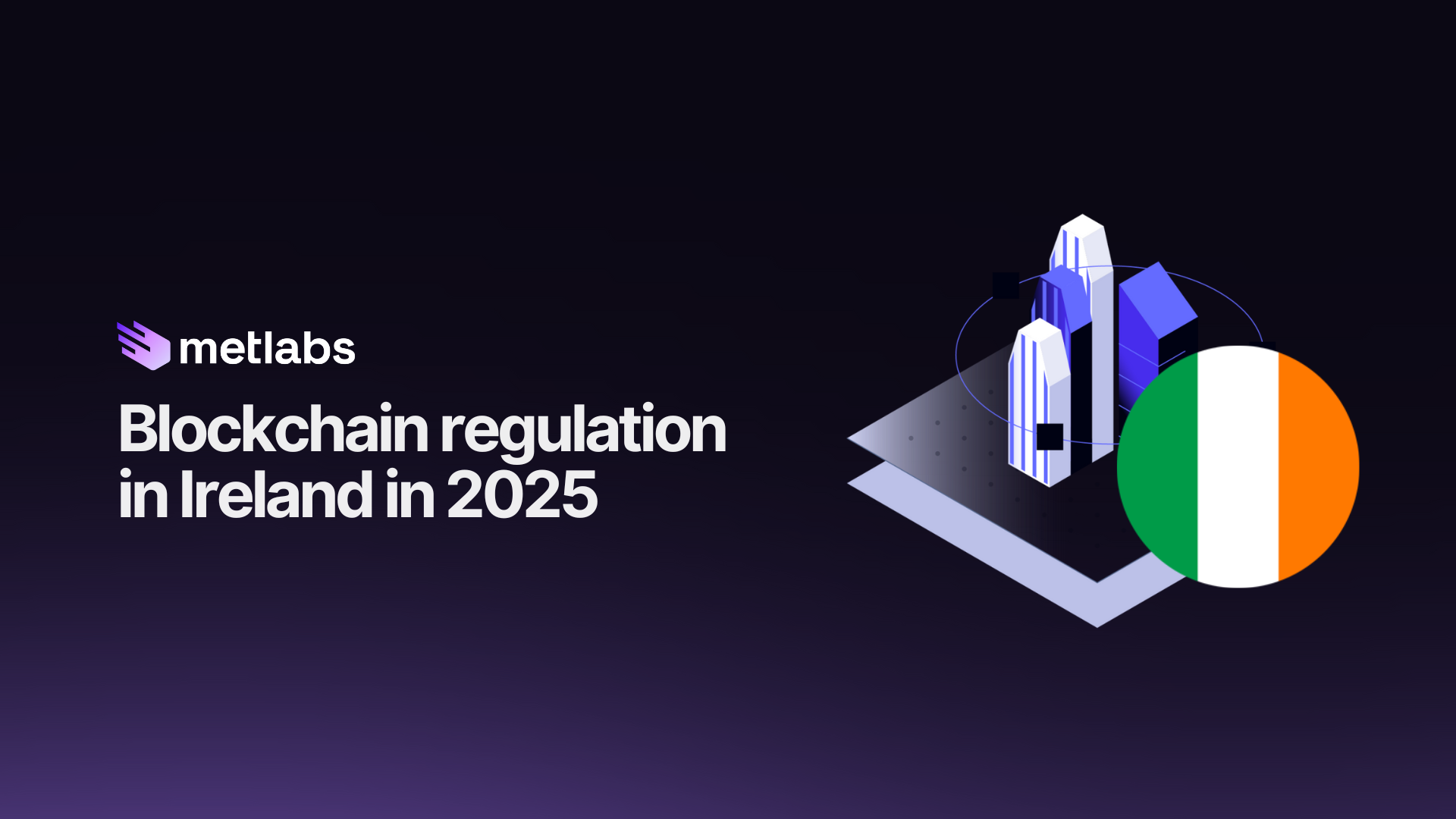The adoption of blockchain technology and asset tokenization is advancing at a rapid pace, but the real engine driving its global development is the existence of a clear, consistent and innovation-friendly legal framework.
Some countries have already established themselves as regulatory benchmarks, establishing specific rules for cryptoassets, DLT infrastructures and token issuance with legal backing. In this article we show you the relevant information about blockchain regulation in Ireland, which you can use as a guide if you are looking to operate internationally or evaluate different strategic locations.

Current legislation on blockchain and virtual assets in Ireland.
MiCA Regulation (Markets in Crypto-Assets Regulation)
Establishes the EU’s first comprehensive legal framework for regulating cryptoasset issuers and service providers (CASPs). Covers stablecoins, utility tokens, electronic money tokens (EMTs), asset referenced tokens (ARTs), and custody or exchange platforms. Requires prior authorization, governance requirements, solvency, transparency, and user protection.
MiFID II (Markets in Financial Instruments Directive II)
Security tokens and derivatives on cryptoassets are regulated under MiFID II. Platforms must be licensed as an investment firm, under the control of the Central Bank of Ireland, complying with prudential, transparency and governance requirements.
Criminal Justice Acts
CASPs in Ireland are subject to the national AML/CFT framework, derived from the Criminal Justice Acts. They must register with the Central Bank of Ireland, implement KYC controls, monitor cryptoasset transactions and report to the Irish Financial Intelligence Unit.
Sandbox, DLT Pilot Scheme and Innovation Hubs in Ireland
Ireland actively participates in the European DLT Pilot Scheme, which enables the development of DLT market infrastructures for tokenized financial instruments. In addition, the Central Bank of Ireland leads the Digital Innovation Hub and collaborates in the European Blockchain Sandbox, promoting the tokenization of real assets, EMT/ART stablecoins and DeFi solutions.
Tokenization allows real-world assets to be digitally represented via blockchain, but for it to have legal value, it is essential that there is a regulatory framework that recognizes this operation. Ireland adopts its own approach, establishing specific rules for the issuance, custody or trading of tokens. In this block we explain how asset tokenization is regulated from a legal point of view, taking an advanced jurisdiction such as Ireland as an example.
Regulation of asset tokenization in Ireland
Asset tokenization in Ireland is fully integrated into the European legal framework. Tokens representing financial instruments, such as stocks, bonds or fund shares, are regulated under the MiFID II Directive and the supervision of the Central Bank of Ireland (CBI). These tokens require authorization for issuance and trading on regulated markets. Utility tokens and EMT stablecoins (electronic money tokens) or ART (asset referenced tokens) are covered by the MiCA Regulation.
Ireland participates in the European Union’s DLT Pilot Scheme, which facilitates the operation of blockchain market infrastructures for tokenized financial instruments. The CBI also promotes innovation in the sector through the Digital Innovation Hub and its involvement in the European Blockchain Sandbox, promoting projects in tokenization, stablecoins and decentralized finance (DeFi).
Tokenization of non-financial assets, such as real estate, art or commodities, is not specifically regulated in Ireland, but is fully valid under private law. Depending on their structure, these projects may be subject to tax, civil or consumer protection regulations. Registries based on DLT technology are legally recognized, providing security for transactions and ownership of tokenized assets.
Regulatory bodies and authorities for digital assets in Ireland
Central Bank of Ireland (CBI)
The CBI is the leading authority on this matter, oversees CASPs under the MiCA Regulation, authorizes the issuance of tokens, exchanges and custodians, and applies MiFID II to security tokens. It also leads Ireland’s participation in the DLT Pilot Regime and the European Blockchain Sandbox.
Irish Financial Intelligence Unit (Irish FIU)
The Irish FIU is the national financial intelligence unit. It oversees compliance with AML/CFT legislation by CASPs registered with the CBI. It manages KYC processes, the monitoring of suspicious transactions and coordinates international cooperation in the fight against money laundering and terrorist financing.
Irish Department of Finance
The Department of Finance is responsible for transposing the European AMLD5 and AMLD6 directives into national law, and for adapting the Irish legislative framework for digital assets. It participates in the definition of national strategies for financial innovation, blockchain and digital economy.
Irish Revenue
The Irish Inland Revenue sets the tax criteria applicable to cryptoasset transactions and asset tokenization. It publishes tax guidelines on capital gains taxation, VAT and reporting obligations, collaborating with the CBI in the fiscal oversight of the sector.
Launching a business based on digital assets requires more than just technology: it is also necessary to comply with legal requirements such as licensing, registration and regulatory obligations. These conditions ensure that the business model is viable and sustainable over time, and that it meets transparency and fraud prevention standards. In this section we explore what licenses are typically required and what compliance criteria blockchain companies operating in Ireland must follow.

What licenses and requirements are needed to trade cryptoassets in Ireland?
CASP License (MiCA)
With the entry into force of the MiCA Regulation in the EU, the CASP license is mandatory for exchanges, custodians, issuers of stablecoins (EMT or ART), cryptoasset service platforms and other activities covered by MiCA. The competent authority in Ireland for granting this license is the Central Bank of Ireland (CBI), which oversees authorization and compliance with MiCA, the CBI is also in charge of supervising stablecoins with potential systemic impact.
Investment Firm License (ESI)
When a platform offers in Ireland derivative products on cryptoassets (futures, options, CFDs), these are considered regulated financial instruments under MiFID II. In this case, the platform must obtain an Investment Firm license, granted by the Central Bank of Ireland (CBI), and comply with all applicable Irish and European legislation requirements.
AML/KYC Compliance
Companies offering cryptoasset services in Ireland are required to comply with national legislation on the prevention of money laundering and terrorist financing, which incorporates the AMLD5 directives. These obligations include implementing KYC procedures, monitoring transactions, identifying beneficial owners and reporting suspicious activity to the Financial Intelligence Unit (FIU) in Ireland.
Other regulatory requirements
In addition to MiCA and AML/CFT, crypto companies operating in Ireland must comply with the DORA (Digital Operational Resilience Act) Regulations. DORA requires the implementation of effective ICT risk management systems, cybersecurity policies, business continuity plans, controls over external technology providers and cyber resilience training programs. Compliance with DORA is essential to maintain the MiCA license and operate legally under the MiCA Regulation.
Are you exploring developing your blockchain project in Ireland?
At Metlabs we help companies like yours and offer comprehensive support in the development of blockchain projects and tokenization of assets such as real estate, carbon credits, commodities, intellectual property, financial instruments, franchises and more, fully aligned with blockchain regulation in Ireland and international regulatory standards.
Contact us and find out how we can help you meeting all your business model needs, from technical validation and structuring to design, development and implementation of custom blockchain solutions, ready to scale from day one.



